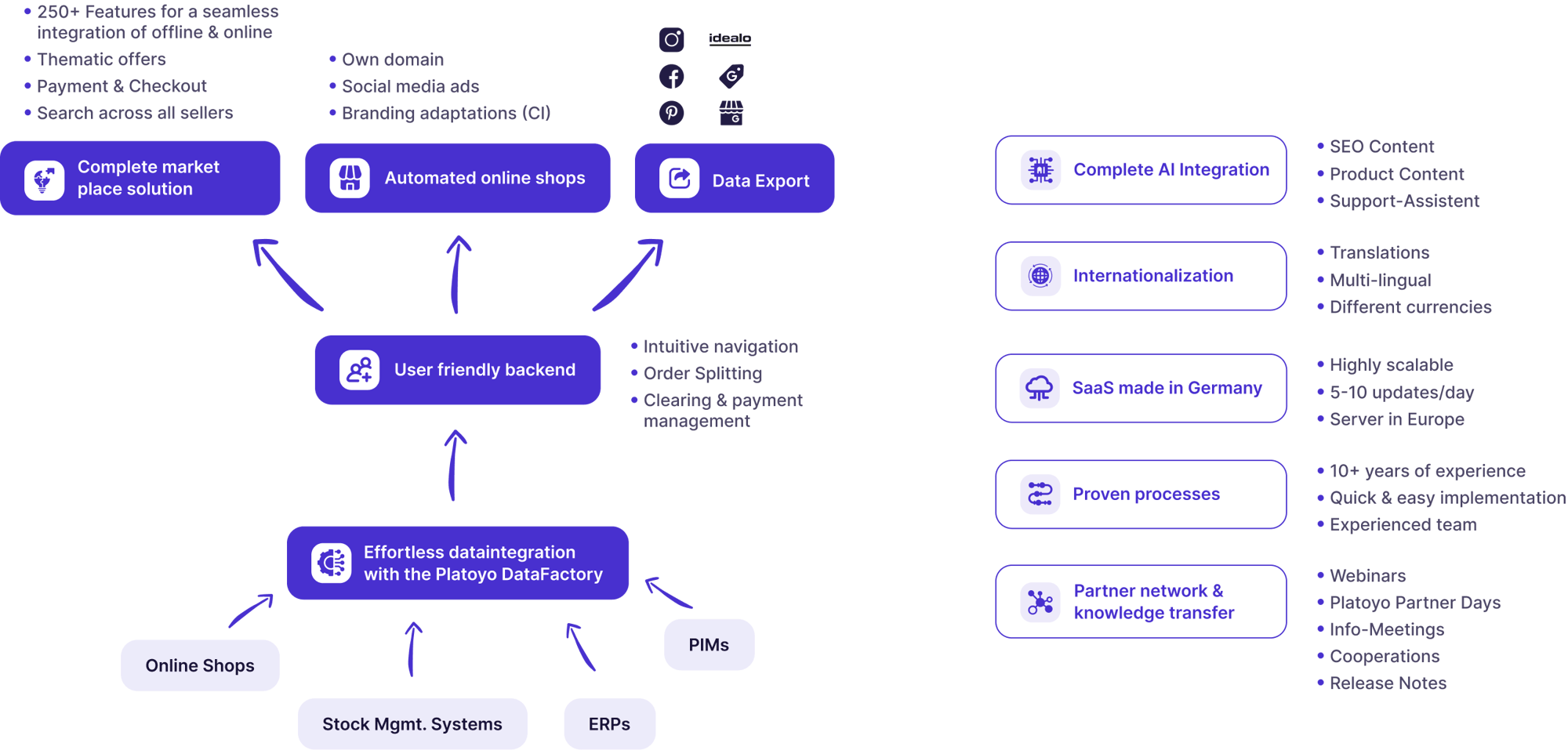
Omnichannel Platform
More than 250 features
Platoyo creates a fully equipped and highly scalable omnichannel solution, online marketplace or multi-vendor platform for you in the shortest possible time. The features cover the entire process from data import and marketplace functionalities to payment and logistics. You don't need a software developer or your own server. In this overview, we list the most important of the more than 250 features of the Platoyo omnichannel solution.
Online marketplace, multi-shop solution, commerce platform - ready to go with Platoyo!
"We win Europe-wide tenders for omnichannel platforms. No provider offers as many features as Platoyo!” Hubert Hölzl, CTO Platoyo

-
All features always developed for the seamless connection of online and offline
-
Highly professional Software as a Service (SaaS) solution, made in Germany
-
5-10 updates daily for the best possible performance and user-friendliness
-
10+ years of experience in creating and operating omnichannel platforms
Everything from a single source

Basic profiles
-

Basic Data
Providers can enter various data about themselves and their company (e.g. name, address, phone number, fax number, email, opening hours). -

Description of the business
Providers can describe their business in detail and thus also set SEO accents. -

Google Maps
Each basic profile receives a Google Maps map. -

Pictures
Providers can use several images for the presentation of their profile (e.g. portraits, interior and exterior views, action images, etc.). -

Introduction Video
Suppliers can integrate a YouTube or Vimeo video into their basic profile and introduce themselves personally to their customers. -

Brochures & leaflets
All suppliers can upload brochures as PDF files. The end customer can browse these on the platform and download them as required. -

List of brands
Suppliers can store brands in the system. These are displayed on the respective basic profile and are recorded using the general search function. -

Social Media
Providers can link their social media channels (e.g. Facebook, Twitter, Instagram, Pinterest) to their basic profile. -

Link to your own website
Providers can link their own website directly to their basic profile. -

Search feature
The entries in the basic profile are entered using the general search function. -

Permalink
Each basic profile is given a "speaking" permalink to enable direct links to the profile page. -

Email address
Providers can store different email addresses for e.g. customer contact, accounting and technology. -

Onboarding
Vendors can register themselves on the marketplace. -

GTC as PDF in confirmation email
After the order confirmation from the provider, a confirmation email is sent to the customer. The platform terms and conditions and the revocation policy as well as the retailer's terms and conditions are sent as PDF attachments. -

Individual AGB management
Providers can manage and upload their GTCs independently. -

Packaging register
In accordance with the new Packaging Act (from July 2022), the following information is mandatory for suppliers: 1) Registration number & 2) System operator of the packaging material register system used. -

Click & Reserve Function
Suppliers can activate this service as a button on the product detail page. Customers can reserve a desired product by entering their name and email address.
Marketplace
-

Detailed seller information
Vendors receive their own page on which their vendor information (terms and conditions, etc.) and their legal notice are displayed. -

Warning limited number
The platform gives suppliers a warning when there are only a few products left in stock. -

Internal note field
Retailers can add internal notes to their orders. -

Personal note field
Customers can add a personal note to their order. -

Order Splitting
The cross-retailer order is automatically split into individual orders by retailer after payment. The various delivery types, coupons, vouchers etc. are taken into account. -

Settlement of transactions
The system automatically settles the transactions with the merchants and distributes the credit balances (credit balance minus fees). -

Tip of the day
Admins can place a product prominently on the homepage as the "Tip of the day". -

Service type: Waste electrical equipment take-back
Retailers can now offer their customers the service of taking back old electrical appliances when ordering new goods. The retailer can activate this service independently in the product settings, either with or without fees. -

Shopping lists
Admins can create shopping lists and customers can select these products directly and add them to the shopping cart (e.g. materials for the start of school for a specific class). -

Services for API-Products
Product data imported via the API interface can be supplemented with services, such as the new returns service. Each service is given its own API identifier,... -

Extensive filter functions
Platform operators can define (product) filters such as size, color, brand (incl. aliases). -

Nutritional table
Suppliers can provide a nutritional value table as additional information for food. -

Product import
Retailers can import their products automatically (e.g. from the merchandise management system or online store). -

Extended counter
Retailers can set pre-order times for products. -

Invoice tool
The system automatically sends the invoice to the customer by email on behalf of the retailer (optional). -

Opening hours vs. delivery times
Retailers can specify delivery times that differ from the opening hours during which the couriers can collect the goods. -

Same-Day-Delivery
Suppliers can offer the customer delivery of the goods on the day of the order. -

Delivery methods & delivery costs
Suppliers: You can specify the minimum order value for free delivery. You can also specify whether you deliver orders within a certain radius yourself. -

Click & Collect
Retailers can offer "Click & Collect", i.e. users pay online and pick up the products themselves in the store. -

Widget "More products"
The system automatically finds similar products for the product focus. -

Local job market
Platform operators, city managers and local providers can now advertise vacancies clearly and concisely. -

Order extras
Suppliers can offer additional extras in the ordering process free of charge or for a fee (e.g. gift wrapping or a personal note). -

Comprehensive shopping cart & payment process
The marketplace enables a comprehensive shopping cart across all retailers with a single payment process. -

Special offers
Suppliers can set promotional prices for their products. The special price is highlighted on the product. -

Campaign Tool
Admins can create campaigns with titles, descriptions and product lists and place them prominently on all pages. -

Coupons
Suppliers can deposit coupons for redemption in the stationary store. -

Zoom view
Vendors inside can enlarge images and view details on the product detail page. -

Allergens text field
Retailers can explicitly point out allergens in their products. -

Manual product input
Retailers can enter their products manually. -

Individual product sequence
Retailers can specify the order in which their products are displayed on their store profile. -

Video app for retailers
Retailers can confirm orders with a video message to thank you personally and give tips for the purchased goods. -

Email & SMS notifications
Retailers receive an email or SMS when an order is received. -

National orders
Suppliers can shop on the platform throughout Germany. -

Own delivery
Retailers can configure their own deliveries (delivery area, costs, time window). -

Subsidization of delivery costs
Retailers can specify cheaper deliveries for minimum order values. -

Change history GTC management
Operators can use the change history to see exactly which changes have been made to the GTC settings. -

Admin - Manage privacy settings
Administrators can manage the data protection provisions on the platform themselves and change them as required. The change history shows all previous changes.
Service provider
-

Detailpages
Each service has its own detail page with a detailed description and pictures, an appointment scheduling tool and the address, Google Maps, opening hours and contact options. -

Picture Upload
Providers can upload vivid images to their profile. -

Media
Service providers can add images to their services. -

Scheduling tool
Service providers use the appointment scheduling tool to coordinate specific customer requests and can confirm, change or reject them via the system. -

Pricing strategy
Service providers can choose from various pricing strategies (e.g. free of charge, fixed price, price from, price on request).
Gastronomy
-

Profile additions
Restaurateurs can list numerous features on their profiles (e.g. organic, vegan, gluten-free, with a playground, with a beer garden, etc.). -

Online Check-In/ Registration
With online registration, providers have control over the number of visitors to their restaurant. -

Weekly Reminder
The platform sends a reminder once a week so that restaurateurs can update their menus. -

Food and drinks menu as PDF
Restaurateurs can upload their food and drink menus as PDF files. -

Digital menu with QR code
Restaurateurs can completely digitize their food and drink menus on Platoyo. This makes the offer easier for customers to search and filter (e.g. "only show vegan food"). -

QR Code Generator
Restaurateurs can have QR codes generated for each digital menu. Visitors on site can use them to open the menus contactlessly. -

Overview page
All job advertisements on the platform are also displayed on a central page. -

Daily specials
Restaurateurs can highlight selected dishes as a daily special.
Events & Tickets
-

Overview page
On a central overview page, customers can search and filter all events on the platform according to various criteria. -

Calendar of events of the providers
Providers can maintain their own calendar of events on their profile. -

Platform-wide events
The platform operators and admins can create public events. -

Online sale of event tickets
Customers can purchase tickets for a desired event directly via the event calendar (without seat selection).
World of brands
-

Brand directory
The system lists all activated brands for providers on a central page in alphabetical order. -

Brand page
Each activated brand automatically receives its own page with logo, mood image, background text and a list of all providers and products on the portal. -

Brand filter
Customers can filter products by activated brands. -

Brand alias
Admins can store aliases with different spellings and spelling mistakes for a brand in order to intercept incorrect entries by retailers. The system then displays the correct spelling. -

White-Listing
Tokens are explicitly released by the admins in order to prevent incorrect entries by retailers. -

Brands in the store
The brands of the products listed online are automatically recognized and processed by the system. Retailers can also enter brands that they only stock in the store.
Automated Online Shops
-

Online-Shop
Suppliers can activate their own online store. -

Logo
The company logo can be integrated into the automated online store. -

Main menu
The main menu in the automated online store can be customized according to the operator's preferences. -

Payment & billing
All payment processes and invoicing for the automated online store are carried out via the associated platform. -

Individual Google evaluations
Owners of an automated online store have their own access to Google services such as Google Analytics, Google Ad Services, etc. -

Product selection
Each automated online store only displays the product range of the respective provider. -

Individual domain
Each automated online store has its own domain that can be accessed via the Internet.
Branch system
-

Overview page
Different stores can be combined into a chain on the platform. Each chain has its own overview page with a list of stores and products. -

Product grouping
The search function groups similar products from different stores and, if desired, displays all retailers who stock the product. -

Extended availability display
Products that are available in more than one store in a chain receive a corresponding notice and a list of the stores carrying the product, including a Google Map -

Multi-Shop Management
With one login, employees can edit all stores in the chain, process orders, retrieve invoices and much more, depending on their rights. -

Role system
With the help of the detailed role system, different authorizations can be stored for employees. This includes order management, statistics, changes to prices and availability, voucher management, etc. -

Change history
Manual changes to data are logged by the system for a period of 60 days and displayed to the chain admin. This includes, for example, editing store data, product prices, changes to entrances, etc.
Filter system
-

Product and supplier filter
Product and provider filter for city districts and streets. -

Filter configuration
Filters are very important for a targeted search. Admins can set up filters according to the specific needs of the platform. -

Local search limitation
Customers can narrow down their search for providers using geographical search criteria (e.g. entering the city, zip code, size of the radius, etc.). -

Attribute mapping
Admins can map and group attributes and values for the filters, e.g. "black" and "deep black" are assigned to the "black" filter. -

White-Listing
If required, only activated attributes and values are used in the filter to catch incorrect entries by retailers. -

Search bar - Autocomplete function
Search hits are displayed in the preview as you type in a search term.
Platoyo Data Factory
-

Any format
Platoyo can handle all formats: CSV, XML, JSON, etc. -

Any rules
Individual rules and logics can be stored for each external PIM and each stock file. -

Any stock sources
Retailers can import their inventory data from several merchandise management systems into Platoyo. -

Any product data sources
Retailers can obtain their product master data from several brands. -

Any transmission path
Platoyo can retrieve the data via FTP, URL, API or Dropbox. -

Any rhythm
You can freely configure the frequency at which the import should take place (from a few minutes to several days). -

Difference or complete imports
The system supports complete imports or the retrieval of changes since the last change. -

Blocking of data
Criteria can be defined that prevent products from being displayed (e.g. minimum stock of products, specific brands or certain categories). -

Mapping
Retailers can define their mapping. The system notifies the respective retailer when new mappings are required. -

Monitoring
Platoyo contacts the administrators to analyze errors if the number of available products drops unexpectedly. -

Any export format
The data transformer can also make the data available in its format for its own purposes (e.g. for your own online store).
Interfaces / API
-

GraphQL interface
The extensive GraphQL interface enables the retrieval of a wide range of data from the platform (profile data, product data, product search, events, delivery data, categories, etc.). -

Import event data
The system imports event data from external sources directly into the platform. -

Product export
Product data is available in various formats for use on third-party platforms as a feed (Google Shopping, Facebook, Idealo, etc.). -

Orders via API interface
Suppliers can connect their merchandise management system to the Platoyo systems in order to retrieve open orders and confirm them directly in their merchandise management system. -

Postmark
Sending of emails via Postmark (monitoring dispatch, prevention of being classified as SPAM).
City voucher system
-

Online and offline purchase of vouchers
Vouchers can be easily purchased and redeemed online and offline. -

Voucher branding
The online and offline vouchers can be individually branded. -

Employer vouchers
Employers can manage the vouchers to their employees independently via the platform. -

Voucher system: Different fees for retailers
Commissions can also be set at provider level in the voucher system. -

Online directory of all providers
A provider overview list shows all acceptance and redemption points. -

Fully automated billing
Billing, debits and credits between providers are fully automated by the platform. -

Free number of issuing and acceptance points
The number of companies participating in the voucher system is not limited.
SEO & Social Media
-

SEO Texts
SEO texts and corresponding metadata can be stored for the various areas and categories on the platform. -

SEO tool for optimization
Retailers receive automatically generated SEO analyses for their product data every 4 weeks. -

Search engine optimized structure
The clear structure of the page layout achieves high SEO scores. -

Speaking URL
The system uses speaking URLs to score points with providers and search engines. -

Content-Delivery Networks
The system uses content delivery networks (CDN) to ensure fast delivery of images and other assets. -

Social Media Sharing Functions
Providers can easily share content on their social networks using the share buttons. -

Short URL for profile
Providers can receive short URLs for their profiles, e.g. deindomain.com/schustermann. -

schema.org
The data of a page is also transferred to the search engines in schema.org format.
Job advertisements
-

Show vacancies
Providers can display job advertisements as text or as a PDF document on their profiles. -

Publication period
Providers can set the start and end date of the advertisement.
Statistics
-

Platform's own access to Google Analytics
Providers receive access for the analysis and evaluation of Google Analytics data. -

Statistical evaluations at city and retailer level
Providers can view statistical evaluations on two levels. -

Statistics emails
Providers receive an email every 14 days with the most important parameters and optimization suggestions for the profiles.
Internationalization
-

Multilingual interfaces
The interfaces can be created in several languages. -

Configurable currency
Standard currencies are stored in the system. -

Multilingual content
The content can be created in several languages. -

Configurable tax rates
The control rates can be configured centrally. -

Multilingual product imports
The product data can be processed in different languages. -

Automated translation
Missing translations in the product data are automatically completed with the help of artificial intelligence (DeepL).
Further features & functions
-

Standard routes customizable
The terms in the standard URL can now be customized per platform. For example, the path for vendors on atalanda is /vendor/{permalink vendor}. -

Klarna: Blocking of employees
The employees of a platform operator are not allowed to pay with Klarna payment methods due to Klarna guidelines. With the help of the new feature, Klarna payment methods are automatically deactivated for users who want to order with the operator's email addresses. -

Own domain
Own domain for the operator of the marketplace.
"Our omnichannel platform with over 250 features ranging from simple data integration to payment processing can be used flexibly and quickly. We have been passionately linking online and offline for more than a decade."
Roman Heimbold, CEO Platoyo